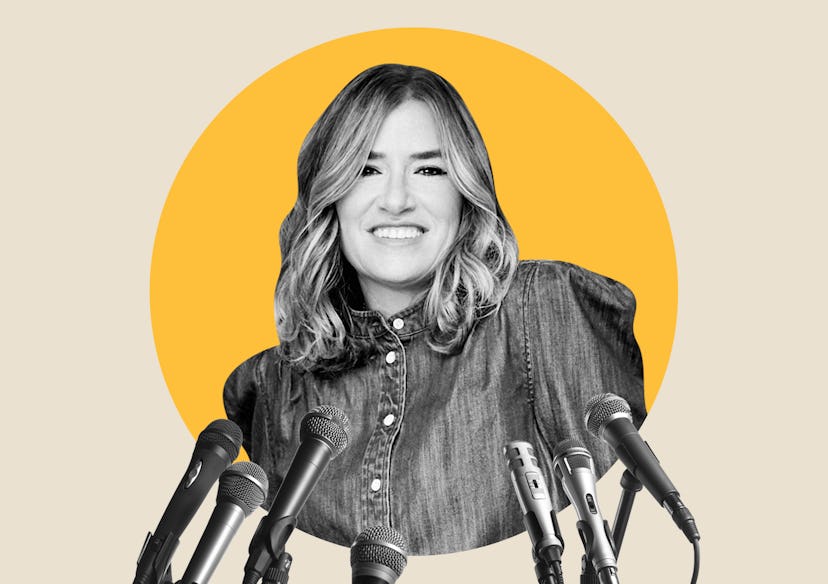Quick Question
Why Drybar Founder Alli Webb Always Wants To “Hear The Bad Stuff”
“I don’t want people sugar-coating things for me.”

In Bustle’s Quick Question, we ask women leaders all about advice — from the best guidance they’ve ever gotten to what they're still figuring out. Here, Drybar founder Alli Webb tells Bustle about her “aha” moment, navigating growing pains, and why she always wants to hear “the bad stuff.”
They say necessity is the mother of invention, and that couldn’t be more true for Drybar founder Alli Webb. In 2010, after years of working as a hairstylist, she decided to blaze her own path as an entrepreneur. She was on a mission to bring the concept of blowouts-on-a-budget to the masses.
“There just wasn’t a thing like Drybar,” Webb says. “I felt like there certainly was a need for it. I felt uniquely qualified to do it. We started working on this concept and never had any idea it would turn into what it has.”
Drybar ushered in a new era in hair care, democratizing the experience of getting your hair done in an environment that feels like hanging out with your BFF, complete with drinks, romcoms playing in the background, and a healthy dose of gossip. “There was no place for women to go for a great blowout at an affordable price in a cool, fun place,” Webb says.
With 150 locations across the country, Drybar is now expanding beyond the salon world into the product space. It now sells branded everything, from brushes to dry shampoo to curling irons.
And Webb recently curated a shoe collection with JustFab for its Leading With Style series, a monthly shoe edit in collaboration with female founders and entrepreneurs. As she has a packed schedule, her personal style revolves around being “dressed-up enough.”
Her shoes, in particular, need to be at least somewhat practical. “I am into being comfortable in my shoes,” she says. “But I also want them to look really cool and chic.” Right now, she’s into black boots with metallic touches, like “a little gold chain” that can work seamlessly with jeans or a more formal dress.
Ahead, Webb reflects on the challenges she faced in those early years after launching Drybar and what surprises her most about her journey.
Take us back to when you founded Drybar. How did you know there was a market for this concept, and what pushed you to go for it?
The idea for Drybar was really a personal necessity. There was nothing like Drybar. I just knew that innately, and always wished and hoped for something like Drybar, because I have naturally curly hair I’ve been fighting with my whole life.
What were you doing at that time?
It was when I was operating my mobile blow-dry business that I realized, “Man, if I can’t do my clients’ hair, where are they going?” They were going to their regular cut-and-color salon, overpaying for a blowout, and dealing with pressure from stylists. Or they were begrudgingly going to the discount chain down the street, where the experience was often variable.
In those early years, what was the toughest challenge you faced and how did you overcome it?
Not messing it up! Growing and scaling this business was something we didn’t have any experience with. It was just every day figuring out what to do next. We were able to bring in a lot of really smart people — smarter than us — in growing and scaling a business that was getting as big as ours was. There was just so much demand. We wanted to meet all that demand, but we didn’t really have the experience to do it.
You scaled your business pretty quickly. Which obstacles did you face with so much growth?
Keeping it good from location to location. Which is really the thing that’s always kept me up at night — making sure the experience is great no matter which location you go to. Figuring out how to do all that, how to get everybody paid on time — it was just a million things to do. That’s why we brought in a lot of people to help. It never really lets up. But once you can get in front of it and hire ahead of the curve, that’s when you know you’re in good shape.
When you look back on your journey, what surprises you the most?
How fast it all goes. I can’t believe we started this company ten years ago. I wish I didn’t worry as much as I worried and was able to enjoy it a little more. It was so stress-inducing. It felt like there was so much at stake, which there was.
Tell us the most valuable business advice you’ve ever received.
Being really open to feedback is a big one. Also creating an environment where people feel they can tell you the truth. I’ve learned that along the way. I used to be really tougher to be around, tougher to tell the truth to. It’s really easy, as a founder, to get yourself set up into this culture of people telling you what they think you want to hear.
What do you mean by that?
I don’t want to hear just the good stuff. I want to hear the bad stuff. I want to understand what’s really going on. I don’t want people sugar-coating things for me. The best advice I learned along the way was to be open to that feedback from both your clients and the people you’re working with. It really makes everything better.
This interview has been edited and condensed.
This article was originally published on